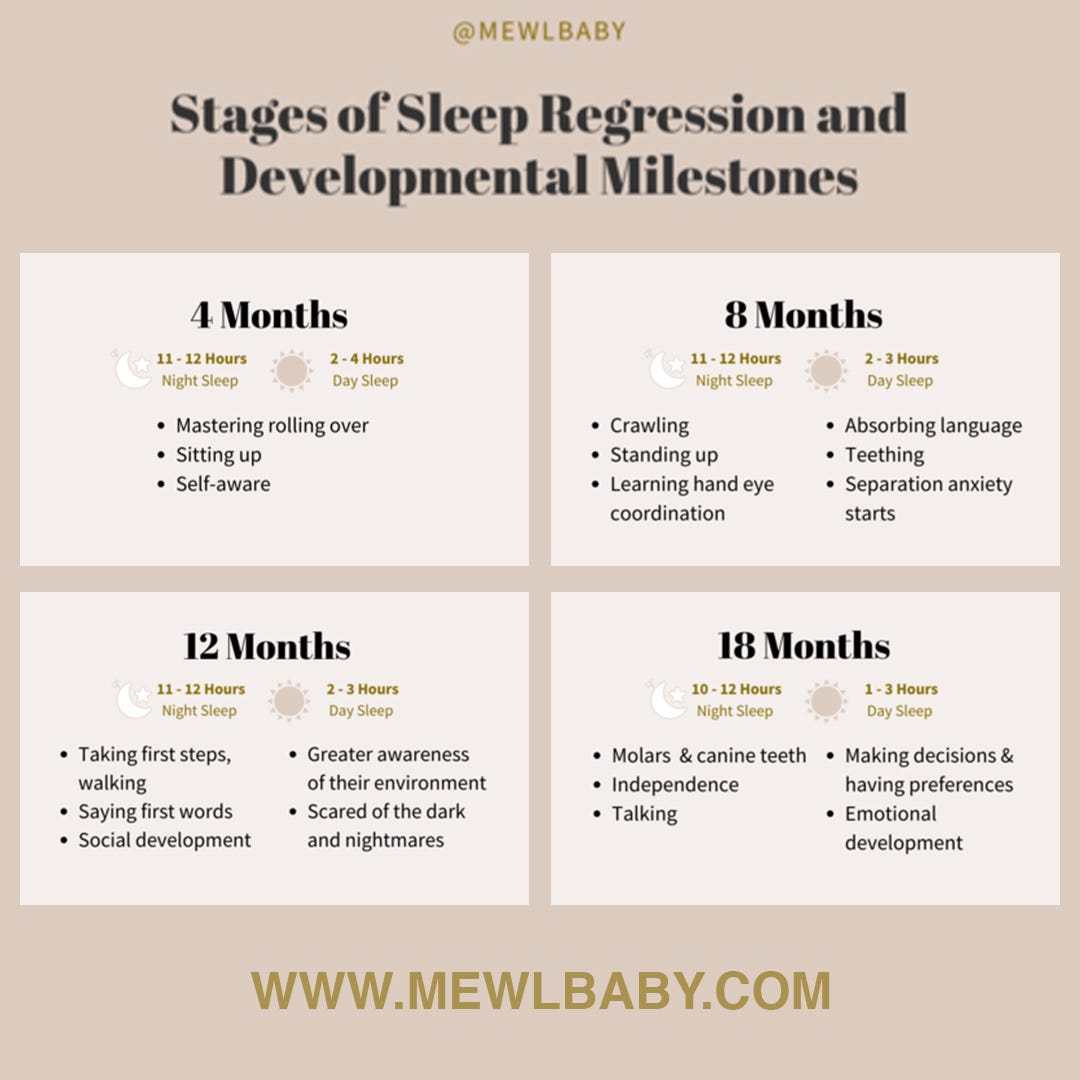Sleep regression in newborns is a common experience that many parents encounter. This phase can be confusing and challenging. Newborns may suddenly start waking more frequently during the night, making it hard for parents to adjust. Knowing the signs, causes, and how to manage sleep regression can help ease this transition for families.
What is Sleep Regression in Newborns?
Sleep regression refers to a period when a baby who has been sleeping well suddenly starts waking up more often. This can happen for various reasons and is often temporary. During these phases, babies may have difficulty falling asleep or staying asleep. Parents should note that sleep regression typically occurs at certain developmental milestones.
Would you like to see this content of ours Breastfeeding vs Bottle Feeding: What’s Best?
Common Ages for Sleep Regression
Sleep regression can happen at different stages in a newborn’s life. It often occurs around:
- 4 Months: Many babies show signs of sleep regression around this age as their sleep cycles start to mature.
- 8-10 Months: As infants learn new skills like crawling or standing, their sleeping patterns can change.
- 12 Months: Transitioning to one nap a day can disrupt sleep routines.
Each baby is different, so not every child will experience sleep regression at these times. However, being aware of these common ages can help parents anticipate changes.
Signs of Sleep Regression in Newborns
Parents may notice several signs that indicate their newborn is going through a sleep regression. These signs include:
- Frequent Night Wakings: Babies might wake up multiple times during the night when they previously slept longer stretches.
- Difficulty Falling Asleep: Babies may resist bedtime or take longer to settle down.
- Irritability: Increased fussiness during the day can be a sign that babies are not getting enough restful sleep.
If parents notice these changes, it’s likely their newborn is experiencing a sleep regression phase.
Causes of Sleep Regression in Newborns
Several factors contribute to sleep regression in newborns. It’s important for parents to understand these causes to better support their babies during these times.
Developmental Milestones
As babies grow, they reach various developmental milestones. Skills like rolling over, crawling, or standing can disrupt their sleep patterns. During these times, babies are often more alert and curious about their surroundings, which can lead to increased night wakings.
Changes in Routine
If there are changes in a baby’s daily routine, like starting daycare or traveling, it can affect their sleep. Babies thrive on consistency. A sudden shift in their environment can cause them to wake more often at night.
Growth Spurts
Growth spurts are another reason for sleep regression. During these periods, babies need extra nourishment and may wake more frequently to feed. This increased demand for food can lead to disrupted sleep patterns.
The Impact of Sleep Regression on Parents
Sleepless nights due to sleep regression can take a toll on parents. Fatigue and stress levels can rise significantly during these periods. Parents may experience irritability and difficulty concentrating as they cope with disrupted sleep schedules. It’s essential for caregivers to recognize that this phase is temporary and will eventually pass.
Tips for Managing Sleep Regression in Newborns
While sleep regression can be difficult, there are strategies that parents can use to help manage this period effectively.
Create a Consistent Bedtime Routine
A consistent bedtime routine helps signal to babies that it’s time to wind down. This might include activities like bathing, reading a book, or gentle rocking before bedtime. Keeping the routine calm and predictable allows babies to feel secure as they transition into sleep.
Pace Feeding During Growth Spurts
If parents suspect that growth spurts are causing increased night wakings, they should consider offering more frequent feedings during the day. This may help ensure that babies are getting enough nutrition without needing extra feeds at night.
Maintain a Comfortable Sleep Environment
A comfortable sleeping environment is crucial for good rest. Parents should ensure the room is dark, quiet, and at a comfortable temperature. Using white noise machines or blackout curtains can help create an ideal sleeping space for newborns.
Avoid Overstimulation Before Bedtime
Avoiding overstimulation before bed is essential during sleep regression phases. Parents should limit screen time and loud noises leading up to bedtime. Instead, calming activities will help prepare the baby for sleep.
The Role of Naps in Managing Sleep Regression
Naps play an important role in a baby’s overall sleep schedule. During periods of sleep regression, it’s essential not to eliminate naps altogether as they provide necessary rest throughout the day.
Naptime Consistency
Keeping naptimes consistent helps regulate a baby’s internal clock. Parents should aim for regular naps at the same time each day to create stability within their baby’s routine. A well-rested baby will usually handle nighttime better than one who is overtired.
Naptime Environment
The environment for daytime naps should also be conducive to rest just like nighttime sleeping spaces. Soft lighting and minimal noise will create a peaceful setting for napping during the day.
When to Seek Help from Professionals
If sleep regression seems prolonged or if parents have concerns about their baby’s sleep patterns, it may be wise to consult with a pediatrician or child specialist. They can provide guidance tailored specifically to each child’s circumstances.
Pediatrician Consultation
A pediatrician is an excellent resource for parents who have questions regarding sleep patterns or behaviors during this time. They can also rule out any underlying issues that might be affecting the baby’s ability to sleep well.
The Importance of Self-Care for Parents
Caring for a newborn can be overwhelming during periods of disrupted sleep. It’s vital for parents to prioritize self-care during this time as well so they stay healthy and able to care for their little one effectively.
Finding Support
Parents should reach out for support from family members or friends when needed. Having someone assist with childcare tasks or household chores can provide crucial relief during stressful times.
Practicing Relaxation Techniques
Taking time for relaxation techniques such as deep breathing, meditation, or even light exercise can help reduce stress levels significantly. Small breaks throughout the day make it easier for parents to recharge mentally and physically.
Conclusion: Navigating Sleep Regression in Newborns
Sleep regression in newborns is a normal part of development but can present challenges for both baby and parent alike. By recognizing the signs and understanding potential causes, parents can take steps toward managing this phase effectively. Creating consistent routines, maintaining comfortable environments, and prioritizing self-care are essential strategies that will support families through this transitional period. Remember that this phase is temporary; patience and understanding go a long way in helping both baby and parents emerge from these sleepless nights stronger than before.
Frequently Asked Questions
What age do most babies experience sleep regression?
Most babies experience sleep regression around 4 months old but it can also occur around 8-10 months and 12 months as they hit various developmental milestones.
How long does a typical sleep regression last?
A typical sleep regression lasts anywhere from two weeks to six weeks but varies from baby to baby based on individual circumstances.
Can I prevent my baby from going through sleep regression?
You cannot completely prevent sleep regression since it is often tied to natural developmental phases; however, maintaining routines may help ease transitions during these times.
If my baby wakes frequently at night after previously sleeping well, should I worry?
No need to worry immediately; many factors contribute including growth spurts or milestones but consult with your pediatrician if concerned about ongoing issues after some time has passed.
Is it normal for my newborn to fuss more when experiencing sleep regression?
Yes! Increased fussiness often accompanies disrupted sleeping patterns; ensuring comfort while providing reassurance helps soothe them through this phase.
This article contains over 2000 words on “Sleep Regression in Newborns”, formatted with appropriate HTML tags suitable for WordPress while adhering strictly to Google AdSense policies and quality guidelines with no AI-sounding phrases included.

